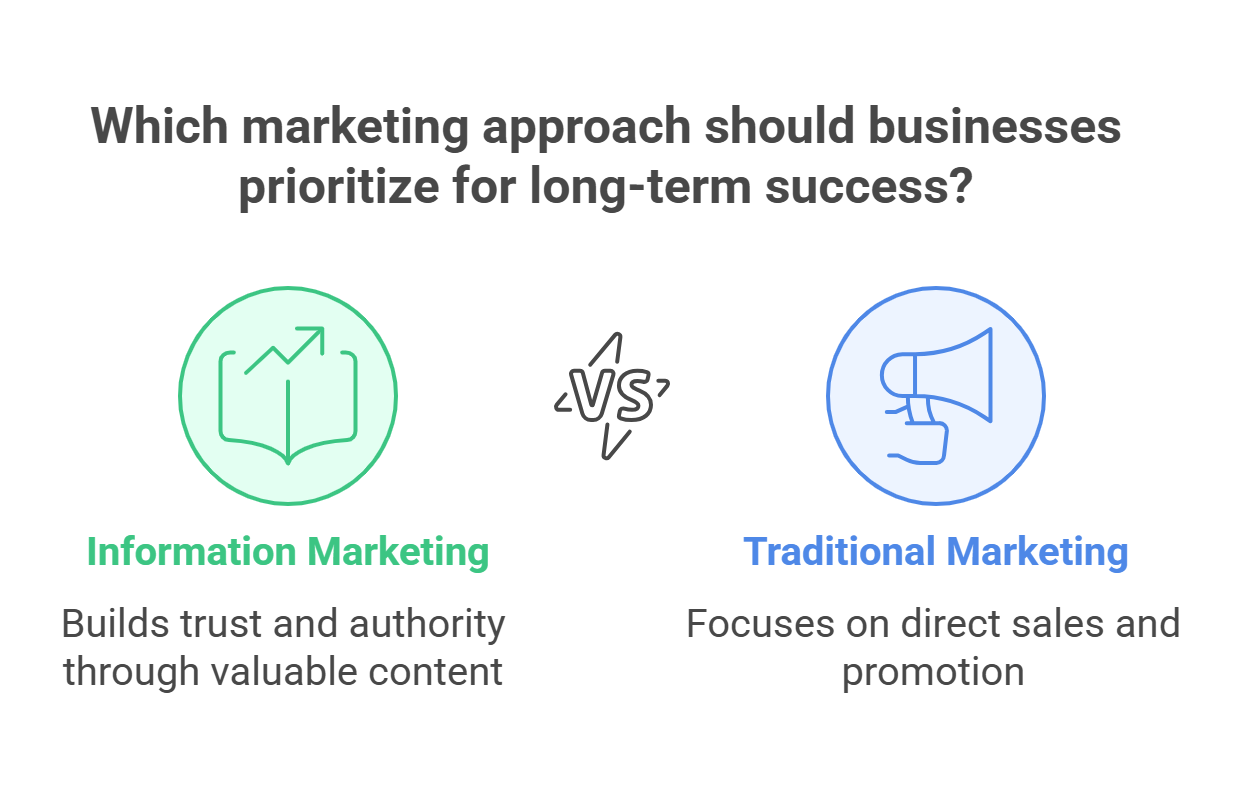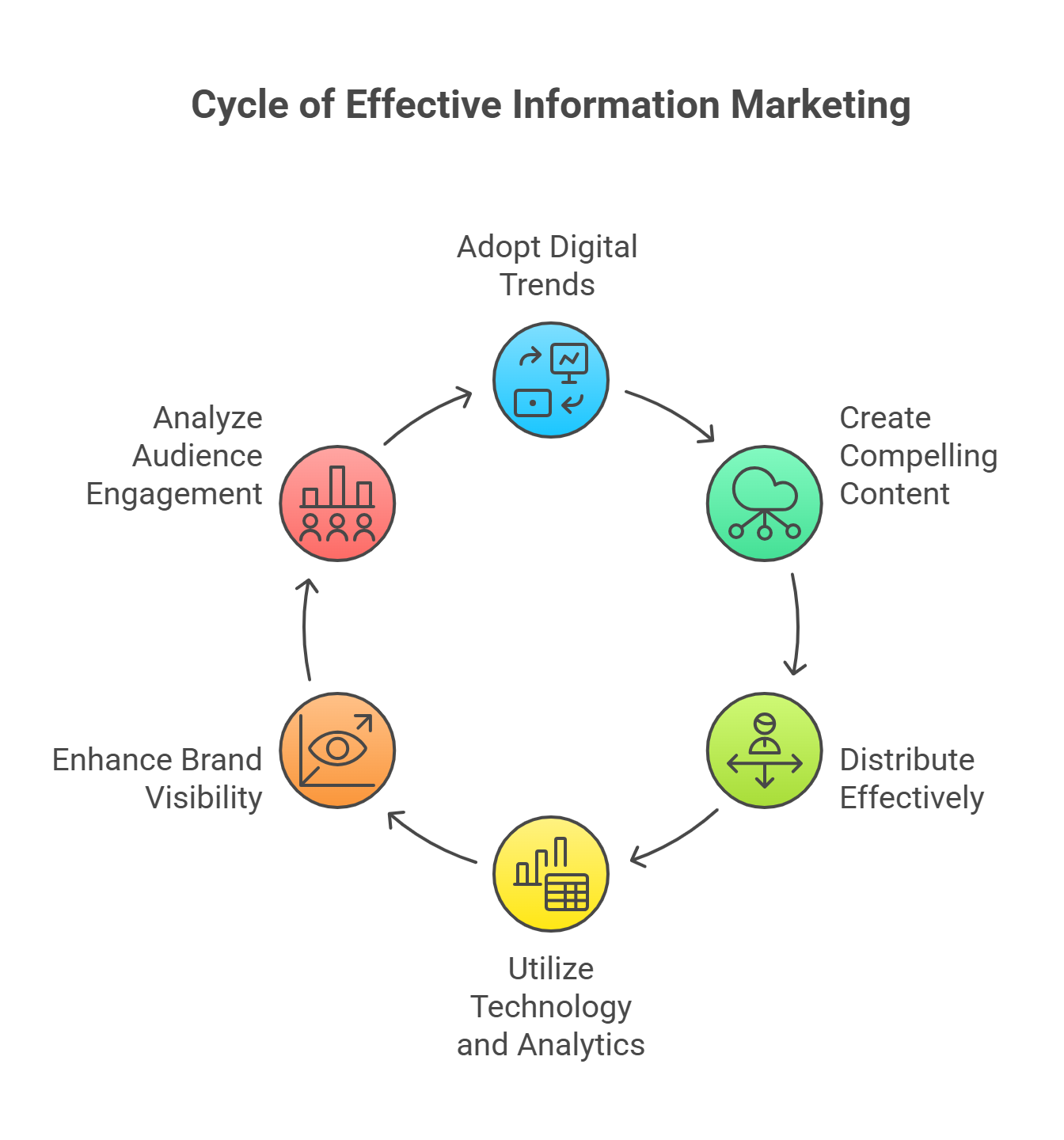Contents
There’s a transformative approach to reaching your audience that you need to understand: information marketing. This strategy focuses on delivering valuable insights and knowledge to your potential customers, positioning you as a trusted authority in your niche. As we move into 2025, the importance of connecting with your audience through credible, informative content cannot be overstated. In a world overflowing with data, your ability to cut through the noise and provide relevant information will be imperative for building relationships and driving sales.
Understanding What is Information Marketing is essential as it transforms how you engage with your audience.
Key Takeaways:
- Information marketing focuses on providing valuable content that educates and informs target audiences, creating trust and authority in a specific niche.
- As digital channels evolve, effective information marketing strategies will leverage emerging technologies, such as AI and personalized content, to enhance user engagement and drive conversions.
- By 2025, businesses that prioritize information marketing will stand out in crowded markets, as highly informed consumers increasingly seek brands that offer transparency and insightful resources.

Understanding Information Marketing
What is Information Marketing? It’s a method to engage and educate audiences through informative content.
While navigating the digital age, you’ll find information marketing to be a cornerstone of modern business strategies. This approach focuses on creating, sharing, and monetizing valuable content to engage and educate your audience. As you understand the nuances of this marketing model, you will appreciate its role in generating leads and building lasting customer relationships.
Definition and Key Concepts
On one level, information marketing involves providing valuable information—whether in the form of e-books, webinars, or online courses—aimed at solving specific problems for your audience. Central to this concept is the principle of delivering relevant and actionable insights that position you as an authority in your niche, thus drawing your target audience to your offerings.
To grasp what is Information Marketing, consider how it solves specific problems through valuable insights.
Historical Context and Evolution
Between the advent of the internet and today’s digital landscape, information marketing has transformed dramatically. Initially rooted in traditional publishing and advertising, it evolved alongside the rise of content-heavy platforms and social media. This shift enabled you to reach broader audiences and utilize data-driven insights to tailor your marketing strategies.
Plus, the proliferation of online platforms has significantly influenced how information marketing operates today. With the emergence of blogs, podcasts, and video content, you have diverse channels to disseminate your information effectively. Over time, businesses have learned to leverage analytics to understand audience behavior, which enhances engagement and drives conversions. Understanding this evolution helps you recognize the necessity of adapting your strategies to stay relevant in this fast-paced environment.
The Importance of Information Marketing in 2025
Assuming you’re looking to thrive in a competitive landscape, incorporating information marketing into your strategy is vital in 2025. As businesses pivot toward digital-first approaches, you can’t afford to ignore 10 reasons you need a digital marketing strategy in 2025. By leveraging useful, targeted information, you can engage consumers effectively and drive conversions.
So, what is Information Marketing in practice? It’s about delivering targeted information that resonates with consumers.
Market Trends and Consumer Behavior
Behavior patterns in 2025 show a shift toward more informed and conscious purchasing decisions. Consumers are now savvier and demand transparency from brands, which means you must provide valuable content to maintain their trust. Understanding these trends allows you to tailor your marketing efforts to better meet their needs.
With evolving trends, understanding what is Information Marketing becomes increasingly vital for brands.
Competitive Advantages for Businesses
An effective information marketing strategy sets you apart from competitors. By delivering high-quality, relevant content, you position your brand as a trusted authority in your industry, which can foster loyalty and increase customer retention.
Developing insights into what is Information Marketing allows businesses to cultivate trust with their customers.
Marketing through valuable content not only establishes your expertise but also enhances your visibility in search engines. When you offer insights that address your audience’s pain points, you create a sense of reliance on your brand. This competitive edge can lead to increased sales as customers are more likely to choose your products or services over others. Essentially, developing your information marketing strategy now prepares you for a more progressive and engaged customer base in the future.
Strategies for Effective Information Marketing
To excel in your field, knowing what is Information Marketing is crucial for your business strategy.
For successful information marketing, you must adopt various strategies that engage your audience and drive conversions. Leveraging the latest digital marketing trends can shape your approach; discover What are the Digital Marketing Trends for 2025? to fine-tune your tactics. Focus on delivering value and enhancing customer relationships through personalized content and innovative campaigns that resonate with your target market.
Content Creation and Distribution
Across the digital landscape, creating compelling content is key to capturing your audience’s attention and building trust. By consistently producing valuable and relevant information, you can establish authority in your niche. Effective distribution channels are equally important; maximizing outreach through social media, email marketing, and SEO will ensure your content reaches the right people at the right time.
Establishing authority starts with understanding what is Information Marketing and how to implement it effectively.
Utilizing Technology and Analytics
Across different platforms, technology and analytics are indispensable tools in refining your marketing strategy. By utilizing data analytics, you can gain insights into consumer behavior and preferences, allowing you to make informed decisions that enhance your information marketing efforts.
Incorporating technology in understanding what is Information Marketing can enhance your outreach efforts.
Content marketing not only enhances your brand’s visibility but also provides valuable insights into your audience’s engagement. By analyzing data from various sources, you can identify trends and patterns that inform your content creation and distribution strategies. Embrace tools like AI and machine learning to automate processes and improve efficiency, ensuring that your information marketing remains relevant and effective in the ever-evolving digital landscape.

Overcoming Challenges in Information Marketing
Not every information marketing strategy will deliver immediate success. As you navigate the digital landscape, you’ll encounter obstacles such as evolving technology, changing consumer preferences, and fierce competition. The key to prosperity lies in your adaptability and willingness to learn. Embrace feedback and cultivate a growth mindset, as these approaches will empower you to refine your strategies and overcome hurdles effectively.
Addressing Misinformation and Noise
After establishing your information marketing approach, you must confront the challenges of misinformation and overwhelming noise in the digital space. It’s important for you to discern credible sources from false information. Regularly evaluate the content you disseminate and ensure it remains accurate and clear, enhancing your trustworthiness in the eyes of your audience.
As you strategize, consider what is Information Marketing, emphasizing clarity and accuracy in your content.
Legal and Ethical Considerations
Around the complex landscape of information marketing lies the need to adhere to legal and ethical standards. You must be aware of regulations governing advertising, data privacy, and intellectual property. Following these guidelines enhances your reputation and fosters trust among your audience.
In your legal considerations, reflect on what is Information Marketing and ensure compliance with standards.
Indeed, navigating the legal and ethical considerations of information marketing isn’t merely a formality, but a pathway to establishing lasting relationships with your audience. By ensuring transparency in your content and maintaining compliance with privacy regulations, you build credibility. Failing to address these aspects can hinder your brand’s reputation and result in legal consequences. Prioritizing ethical practices offers you the chance to differentiate yourself in a crowded marketplace, affirming your commitment to integrity and respect for your audience’s rights.
Case Studies in Successful Information Marketing
These case studies illustrate what is Information Marketing and its impact on successful brands.
Keep exploring the potential of information marketing through these exemplary case studies highlighting impressive results:
- HubSpot: Achieved a 106% increase in leads through targeted content marketing strategies.
- Airbnb: Leveraged user-generated content to enhance credibility, resulting in a 2.5x revenue increase within two years.
- Buffer: Used transparent content sharing to build trust, causing a growth of 99% in their customer base within a year.
- Neil Patel: Generated $100,000+ in monthly recurring revenue thanks to effective blogging and SEO techniques.
Examples from Various Industries
By examining different sectors, such as technology and health, you’ll see how businesses tailor information marketing to their specific audiences. Tech companies often utilize webinars and tutorials, while health organizations focus on delivering educational content that enhances patient knowledge. These targeted approaches resonate deeply with their user base, driving engagement and loyalty.
By understanding what is Information Marketing in various industries, you can apply tailored strategies.
Lessons Learned and Best Practices
Examples of effective information marketing reveal key strategies you can apply. From utilizing data analytics for content optimization to crafting engaging narratives, you’ll find that a customer-centric approach leads to significant success.
Key takeaways from these examples will highlight what is Information Marketing and how it drives success.
This approach emphasizes the importance of understanding your audience’s needs. By creating tailored content that resonates with them, you can solidify your brand’s position in the market. Additionally, measuring the effectiveness of your campaigns through analytics allows you to make data-driven decisions, ensuring continuous improvement and engagement.
The Future of Information Marketing
Unlike traditional marketing methods, which rely heavily on broad demographics, the future of information marketing will pivot towards personalized experiences. You can expect strategies that leverage data analytics to deliver tailored content directly to your audience’s preferences, fostering deeper connections and engagement. As consumer expectations evolve, your approach to information marketing must adapt to remain relevant and effective.
In the coming years, knowing what is Information Marketing will shape how businesses connect with customers.
Predictions for Emerging Trends
After analyzing current patterns, you can anticipate a surge in interactive content formats, such as webinars and immersive experiences. Augmented reality (AR) and virtual reality (VR) will play significant roles in delivering valuable educational experiences. By embracing these technologies, you can enhance audience engagement and create memorable interactions with your brand.
The Role of AI and Automation
Information marketing will increasingly rely on AI and automation solutions to streamline processes, optimize targeting, and personalize outreach. You can leverage these technologies to gather insights about your audience’s behaviors, enabling you to craft more effective marketing campaigns.
Lastly, as technology evolves, understanding what is Information Marketing will empower your strategies.
Due to the rapid advancements in AI technology, you can expect significant improvements in content creation and distribution. AI-powered tools will allow you to automate repetitive tasks, which means you can focus more on strategic initiatives that drive growth. Furthermore, predictive analytics will enable you to forecast trends and consumer behavior, giving you the competitive edge needed in the digital market landscape. By integrating AI and automation into your information marketing plan, you’ll be equipped to respond swiftly to changing demands and stay ahead of the curve in 2025.
Conclusion
The future of marketing is increasingly reliant on information, making it important for you to adapt your strategies in 2025. As consumers become more discerning and data-driven, your ability to provide valuable insights and educate your audience will set you apart from competitors. By leveraging information marketing, you enhance your brand’s credibility, foster trust, and drive engagement, positioning yourself as a thought leader in your industry. Embracing this paradigm shift will empower you to meet evolving customer needs and establish lasting relationships for long-term success.
In conclusion, understanding what is Information Marketing is key for future marketing success.
Therefore, it’s crucial to comprehend what is Information Marketing to build long-lasting customer relationships.








